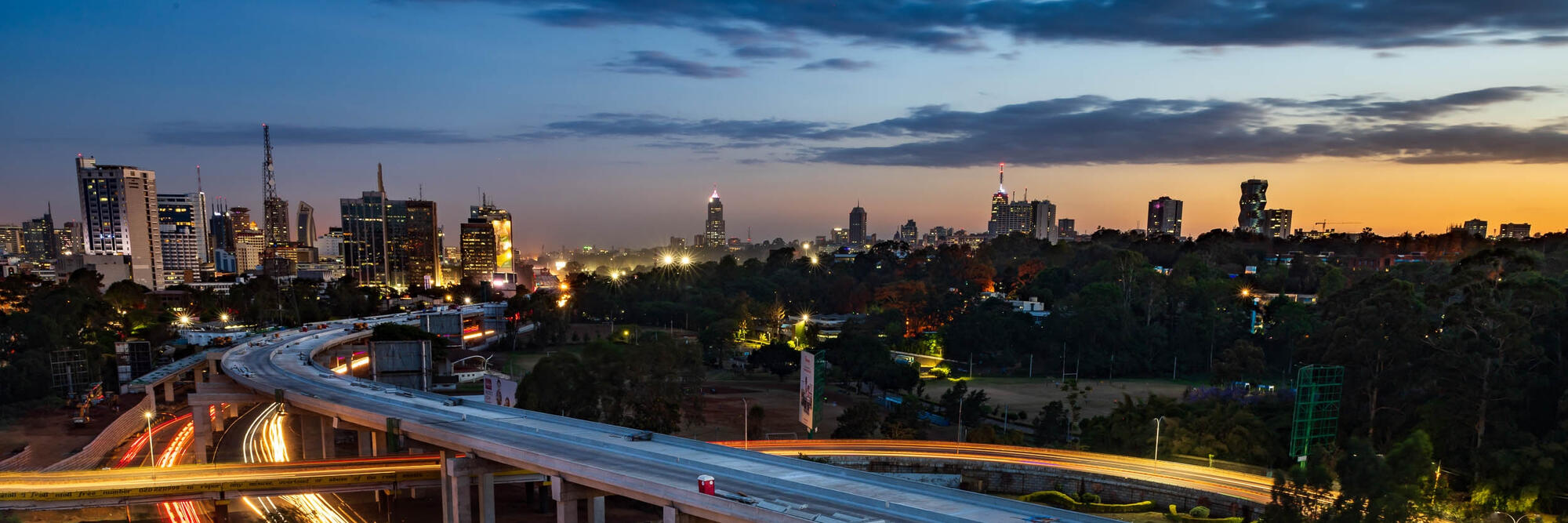Zeynep is a Turkish expat who moved to Kenya with her husband and two children in 2012. They moved to the capital, Nairobi, due to her husband's job. Although she misses the daily comforts of home, Zeynep enjoys the weather and quiet surroundings of her new home in Nairobi.
Read more about Kenya in the Kenya expat guide and more expat experiences in Kenya.
About Zeynep
 Q: Where are you originally from?
Q: Where are you originally from?
A: Istanbul, Turkey.
Q: Where are you living now?
A: Karen, Nairobi, Kenya.
Q: When did you move to Kenya?
A: April 2012.
Q: Did you move with a spouse/children?
A: Yes, husband and two kids.
Q: Why did you move to Kenya; what do you do?
A: We moved to Kenya due to my husband's work. I'm currently studying to become a 'Professional Coach' and writing blogs.
About Nairobi
Q: What do you enjoy most about Nairobi? How's the quality of life?
A: I enjoy the clean air, natural inhabited environment and quiet surroundings.
Q: Any negatives? What do you miss most about home?
A: Definitely missing daily comfort of life such as no water shortages, no power cuts, better road conditions, better quality of craftsmanship, better customer service, anything that makes your life easier. And, of course, active social life, theatre, plays, movies, exhibitions and museums.
Q: Is Nairobi safe? Are there any areas expats should avoid?
A: From my personal experience of an African city, it is ok, but having said that, one should always be careful in and around the city. Some close circle of my friends had some unfortunate experiences; few of them even went back after their experiences. There are certain areas I heard must be avoided, such as Kibela, Kayole, Jericho, and so on. It is wise to avoid going out at night, never drive alone after certain hours, never leave your bag open, do not talk to people who you do not know, and make sure your doors are always locked and windows are up. But you can apply most of these rules to any major metropolitan city around the world.
Q: How would you rate the public transport in Nairobi? What are the different options? Do you need to own a car?
A: I do not use public transport. From my observation, public transport is poorly run, not much regulated by a government agency, there are no traffic rules, and they are not imposed well enough. For transport, there are matatus (we can call these vans) which run privately. Even though I have never ridden any one of them, I can comfortably say they are not safe; drivers do not obey rules (at the beginning of 2013, new traffic regulations were imposed by the government, but I cannot say they are safer now). If one can afford to have a car, it is definitely recommended. To my knowledge, there is no government-run transport system. It is run privately, either by a person or a company. They do not care much about the physical conditions (such as basic seating, seat belts, air conditioning, air ventilators, etc.) of these buses and don't care about basic traffic rules.
Q: How would you rate the healthcare in Nairobi?
A: Unluckily, I've had my share of experiences since I moved here in this subject. If you need to find a doctor, I would definitely recommend 'word of mouth'. So far, I have been to the most well-known private hospitals; one still should research before seeing a doctor. It is always good to take precautions before anything happens. Nairobi is called a major metropolitan city. However, there is still much work to do in terms of getting experienced doctors for routine visits, casualty departments, and pediatric departments. There are not any privately run laboratories where you can do basic blood work even though you have a private doctor's order. Specialized doctors cannot be found on a daily basis; you have to go to a specific location for a specific day of the week. There are doctor shortages in most specialized categories such as paediatrician, OBGYN, internal medicine and so on. Most doctors are General Practitioners, and they always prescribe the same antibiotics. Unfortunately, I cannot make any comments about government hospitals. I've never been in one…
About living in Nairobi
Q: Which are the best places/suburbs to live in Nairobi as an expat?
A: Karen, Gigiri, Runda and Muthaiga.
Q: How do you rate the standard of housing in Nairobi?
A: There are many luxury houses in and around the city. Most of these houses are in gated compounds or standalone. There are also major upscale housing constructions for single houses or apartments. However, a common problem in both types is they lack quality craftsmanship and construction materials. Unfortunately, from my experiences and what I heard from my friends, these high prices and highly marketed houses have poor quality both in terms of the exterior and interior structure. Once you move in, there will be ongoing leaking problems, wiring issues, plumbing issues, and many more issues.
Q: What's the cost of living compared to home? What is cheap or expensive in particular?
A: In terms of housing, it can be a little cheaper, but not much. If you expect certain qualities and necessities, prices go up. For example, if you do not want to deal with power shortages and water cuts, you have to have a generator and water tank in your home, which is costly. The house you live in probably needs fixing on a regular basis. You do not get good labour in return for what your money is worth. It is hard to find people who know what they are doing.
The weather is always pleasant, which allows you to do many outdoor activities. Therefore, you do not need a heater or air conditioning. Because of the wonderful climate, veggies and fruits are very tasty and fresh, which is hard to find these days in developed countries. There are also some nice restaurants and coffee shops you can enjoy in and around the city. Eating out can be slightly cheaper than in other countries, but do not expect too much in terms of service.
The Internet is running very well; there are some shortages with lines sometimes, but nothing major; it is not cheap though.
Q: What are the locals like; do you mix mainly with other expats?
A: I do not have any local friends, but I do know a couple of people due to my daughter's friendships in the compound. I get together either with my expat friends or my neighbours who are expats as well.
Q: Was it easy meeting people and making friends in Nairobi?
A: There are many expats in Nairobi, and most of them are within their own circles. People are friendly, but all are busy with their daily lives, like in any major city around the world. Most expats and their children spend their holidays in their home country. If you attend a gym or are active on social networks, you can easily make friends with people from your country.
About working in Nairobi
Q: What's the economic climate like in the city? Is there plenty of work?
A: Unfortunately, no, there are so many locals who are looking for a job. If you do not move here due to your job, it will be very hard to find one when you are already here. The Kenyan government is very strict about giving jobs to foreigners; priority is given to locals. Networking is very important, maybe more so than in other countries. There are many NGOs, but it is hard to get in. To be on the safe side, always secure your job along with your work permission first and then move here. Work permission takes a lot of time, too much bureaucracy and is very costly (currently, work permits cost $7000-$8000 for two years).
Q: Did a relocation company help you with your move?
A: Yes, we have been moved by an international moving company.
Family and children
Q: Did your spouse or partner have problems adjusting to their new home?
A: No. Having lived in different countries around the world makes you adjust easier.
Q: Did your children settle in easily?
A: When we moved here, I had a one-year-old boy and a five-and-a-half-year-old girl. My daughter started international school, and she has been adjusting pretty well. International schools and their students are very welcoming.
Q: What are the schools like? Any particular suggestions?
A: For expat children, there are many private international schools in the city and surrounding suburbs. Most, but not all, have a British curriculum, and there are few that have an American curriculum. Schools are run by boards and have native English-speaking teachers. There are extracurricular activities provided by the schools on a non-fee or fee basis. From my observation, children are very happy because they are out on the field every day. The weather is always pleasant for them when they are out during the day. They enjoy swimming, playing hockey, cricket, riding a horse, and many more sports activities.
And finally…
Q: Is there any other advice you would like to offer new expat arrivals?
A: I would definitely recommend new expats to search the internet, read as many blogs as possible, talk to friends, ask around and make use of a website such as Expat Arrivals.
~ Interviewed May 2013



